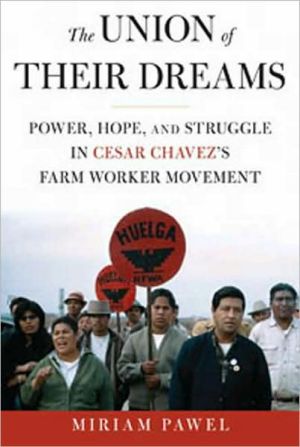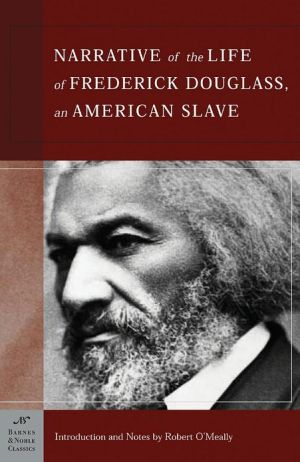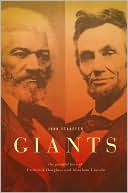Union of Their Dreams: Power, Hope, and Struggle in Cesar Chavez's Farm Worker Movement
The rise, fall, and legacy of the inspirational United Farm Workers movement, and the untold story of iconic community organizer Cesar Chavez.\ A generation of Americans came of age boycotting grapes, swept up in a movement that vanquished California’s most powerful industry and accomplished the unthinkable: dignity and contracts for farm workers. Four decades later, Cesar Chavez’s likeness graces postage stamps, and dozens of schools and streets have been renamed in his honor. But the real...
Search in google:
The rise, fall, and legacy of the inspirational United Farm Workers movement, and the untold story of iconic community organizer Cesar Chavez. A generation of Americans came of age boycotting grapes, swept up in a movement that vanquished California’s most powerful industry and accomplished the unthinkable: dignity and contracts for farm workers. Four decades later, Cesar Chavez’s likeness graces postage stamps, and dozens of schools and streets have been renamed in his honor. But the real story of Chavez’s farm workers’ movement—both its historic triumphs and its tragic disintegration—has remained buried beneath the hagiography. Drawing on a rich trove of original documents, tapes, and interviews, Miriam Pawel chronicles the rise of the UFW during the heady days of civil rights struggles, the antiwar movement, and student activism in the 1960s and ’70s. From the fields, the churches, and the classrooms, hundreds were drawn to la causa by the charismatic Chavez, a brilliant risk-taker who mobilized popular support for a noble cause. But as Miriam Pawel shows, the UFW was ripped apart by the same man who built it, as Chavez proved unable to make the transition from movement icon to union leader. Pawel traces the lives of several key members of the crusade, using their stories to weave together a powerful portrait of a movement and the people who made it. A tour de force of reporting and a spellbinding narrative, The Union of Their Dreams explores an important and untold chapter in the history of labor, civil rights, and immigration in modern America. Library Journal Pawel (former reporter, Newsday) has written a well-integrated and illuminating history of Cesar Chavez's United Farm Workers Union (UFCW) and the related struggle for civil rights. She tells the bottom-up history of the UFCW through the eyes of eight activists whom she interviewed—including a Protestant minister, ordinary farmworkers, and radical lawyers—who devoted years of their lives to Cesar Chavez and his vision. The author thus captures the heady days of early organizing, starting in 1965; Chavez's failure to create a self-sustaining union from the movement that he regarded as his alone; and the ultimate departure of many activists when they became disillusioned with Chavez's leadership. VERDICT This work recognizes Chavez's organizing talents, his personal charisma, and his all-too-human belief that he was the union. Thus, it is a valuable addition to the story of Chavez and the UFCW. Recommended primarily to students of labor and Chicano history, although general readers interested in the changes wrought during the 1960s may well like it, too.—Duncan Stewart, Univ. of Iowa, Iowa City
\ From the Publisher\ “One of the most important recent books on California history, Miriam Pawel has undertaken a thankless task: telling a complicated and in many ways shattering truth … exhaustively researched, by turns sympathetic and deeply shocking … Pawel describes the reality of the movement, not just during the well-studied and victorious period that made it famous, but during its long, painful transformation to what it is today. Her story of one man and his movement is a story of how the ’60s became the ’70s.”—Caitlin Flanagan, Atlantic “Thoroughly researched and thoroughly unsentimental … Pawel is writing outside the hagiography”—Wilson Quarterly “Groundbreaking and moving”—Dissent “A long shelf of books, many bordering on hagiography, has told the union's story just as Chavez wanted it told. The Union of Their Dreams is an astringent corrective to the party line…. this remarkable book…. is an engrossing narrative that is both tragic and inspiring.”—San Francisco Chronicle “A provocative glimpse into recent history, Pawel's exposé offers deep insight into the nature of mass movements.”—Los Angeles Times “In many ways, by illuminating the lives of those who worked so hard for decades, Pawel’s book provides a kind of blueprint for today’s activists. It is a chronicle of great struggle, but also of hope…. The Union of Their Dreams takes an important step toward reminding Americans that, three decades on, La Causa very much remains.” —San Francisco Panorama "Pawel, drawing on and greatly expanding the research she did for the L.A. Times series, has come back for a second dipping with her engrossing and just as exquisitely assembled book… Her tack this time is quite different. Instead of a dry, almost legalistic indictment of the failings of the UFW, her approach now feels like the script of the great Costa-Gavras film The Confession, or like Arthur Koestler’s classic anti-Stalinist memoir Darkness at Noon.”—TruthDig.com “A revealing celebration of activists in the glory days of a movement for change.”\ —Kirkus Reviews “Pawel combines document research with recent interviews with several former directors, legal staff, and rank and file, allowing her to present a thorough and convincing treatment of an important chapter in American history.”—School Library Journal “Steeped in the recordings and primary source materials from these years, Pawel recreates the era—but with an awareness of the ironies and contradictions made plainer by hindsight…. The book’s unexpected scar tissue and its arc of decline present some contrast to the continuing if dispersed legacy trumpeted in Randy Shaw’s recent Beyond the Fields, but these accounts are ultimately complementary and necessary historical revaluations of this important labor and social history.”—PublishersWeekly.com\ \ “In this sympathetic yet courageously honest narrative, a seasoned reporter presents the history behind the legend of Cesar Chavez and the Farm Workers Movement. At the same time, Miriam Pawel pays tribute to the dreams of a generation of young Americans dedicated to social justice and the dignity of labor.”—Kevin Starr, University of Southern California, author of Golden Dreams and California: A History\ “This incisive and sensitive study makes a major contribution to our understanding of Cesar Chavez and the poor people’s movement he led. Moving beyond hagiography and mythology, Miriam Pawel gives new insight into the heroic struggles of some of the ordinary people who committed themselves, against unimaginable odds, to an extraordinary cause.”—David G. Gutiérrez, University of California, San Diego\ “The Union of Their Dreams captures in fascinating detail the human stories of diverse people and how they committed themselves to the movement. It also reveals the tensions and dissensions that were a part of the union and its leadership after the early years of its formation. This is an interesting and provocative book that expands our understanding of the union from inside out.”—Albert M. Camarillo, Stanford University\ “Avoiding polemic or sensationalism, The Union of Their Dreams recounts for the first time how a cult of personality around Cesar Chavez (influenced by the practices of the sinister Synanon organization) ultimately betrayed the courage of the workers in the fields and the trust of a veteran organizing staff. The stories of lost campaigns and internal purges are painful, but they also transmit hugely important lessons about the necessary dialectic of militancy and democracy in labor struggles.”—Mike Davis, author of City of Quartz\ “Miriam Pawel combines the skills of an historian and an investigative reporter to tell the story of the remarkable people upon whose dreams the farm worker movement was established, moved forward, and forever changed the nation.”—William Deverell, Director, Huntington-USC Institute on California and the West\ “Anyone interested in political idealism, trade unions, leadership, mass movements, and even the Barack Obama phenomenon will have much to think about after reading this enthralling account of great accomplishment gained and lost.”—Nicholas von Hoffman, author of Hoax and Citizen Cohn\ \ \ \ \ \ Library JournalPawel (former reporter, Newsday) has written a well-integrated and illuminating history of Cesar Chavez's United Farm Workers Union (UFCW) and the related struggle for civil rights. She tells the bottom-up history of the UFCW through the eyes of eight activists whom she interviewed—including a Protestant minister, ordinary farmworkers, and radical lawyers—who devoted years of their lives to Cesar Chavez and his vision. The author thus captures the heady days of early organizing, starting in 1965; Chavez's failure to create a self-sustaining union from the movement that he regarded as his alone; and the ultimate departure of many activists when they became disillusioned with Chavez's leadership. VERDICT This work recognizes Chavez's organizing talents, his personal charisma, and his all-too-human belief that he was the union. Thus, it is a valuable addition to the story of Chavez and the UFCW. Recommended primarily to students of labor and Chicano history, although general readers interested in the changes wrought during the 1960s may well like it, too.—Duncan Stewart, Univ. of Iowa, Iowa City\ \ \ School Library JournalAdult/High School—Pawel has no problem with the idolization of Chavez as a community/worker organizer. What he accomplished, and how he accomplished it, was truly phenomenal. However, his genius for leading a movement did not extend to managing a union. The charismatic, driven, and exceptionally devoted Chavez was better at getting things going than keeping them on track. The author examines the inspirational rise, wobbly tenure, and ultimate decline and fall of the United Farm Workers movement. She focuses not so much on the leader, but on eight others who were essential to whatever success the movement enjoyed. And the UFW may have seen far greater and sustained success if these voices had not been ignored and/or silenced. Pawel combines document research with recent interviews with several former directors, legal staff, and rank and file, allowing her to present a thorough and convincing treatment of an important chapter in American history. Source notes, a brief bibliography, and a smattering of black-and-white photos help; the lack of an index detracts.—Robert Saunderson, formerly at Berkeley Public Library, CA\ \ \ \ \ Kirkus ReviewsThe inside story of the first successful attempt to unionize farmworkers in the United States. In the early 1960s, workers in America's vineyards and lettuce fields lacked basic protections and rights, writes former Newsday and Los Angeles Times reporter and editor Pawel. Earning about $2,500 per year, they worked without drinking water or bathrooms, were often cheated out of wages and lacked unemployment and health insurance. In this extensively researched history of the United Farm Workers (UFW) union, the author focuses on a handful of men and women who joined la causa of the charismatic Cesar Chavez (1927-1993), taking part in strikes and boycotts to win bargaining agreements. Pawel deftly weaves their stories into a narrative of three turbulent decades of protest against California growers and the U.S. supermarket chains that sold their produce. The principals include teenage farmworker Eliseo Medina, who joined the nascent union movement in 1965 and eventually became a leader; Chris Hartmire, a former East Harlem youth minister who acted as a propagandist in what he deemed to be a moral crusade for the poor; and Ellen Eggers, a naive young college graduate from Indiana, who went from "ignorance to outrage" in her work as a boycott coordinator. These deeply engaged workers and middle-class youths were among thousands who received $5 per week plus room and board as volunteer foot soldiers in a crusade that convinced 17 million Americans to stop eating grapes. Recounting strategizing sessions, dealmaking and internal squabbles, Pawel shows how the movement grew and won legitimacy as a union. The iconic Chavez is seen as a micromanager whose fasts and fervor galvanized others, but whocould not tolerate internal dissent and failed ultimately to build a strong union. By 2005, the UFW had no contracts in the grape vineyards or the lettuce fields, but had "mastered the art of cashing in on Latino political power." Meanwhile, a new generation of farmworkers toiled at minimum wage. A revealing celebration of activists in the glory days of a movement for change. Agent: Gloria Loomis/Watkins Loomis Agency\ \








